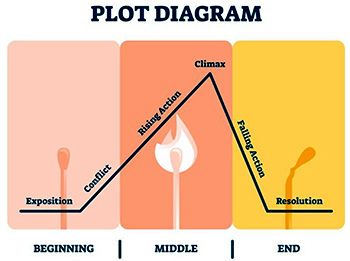Tip #1144: An Excellent Discussion of Plot & Story
… for Random Weirdness
Tip #1144: An Excellent Discussion of Plot & Story
Larry Jordan – LarryJordan.com
It all starts with a plot and story. Here’s how to get started right.


This article, written by Jourdan Aldredge, first appeared in PremiumBeat.com. This is a summary.
Let’s explore the fundamentals of story and plot structure and how filmmakers can use these basics to create their own narratives. In fact, a good script is only as good as the plot — or the story at the center of it all. But, what makes a good story? And, how do you structure the perfect plot for your films and screenplays?
What is a plot? Looking into purely literary terms, a plot is simply: “The plan, scheme, or main story of a literary or dramatic work, as a play, novel, or short story.” Although, for our film purposes, it’s probably best to go with the functional definition: “The sequence of events where each affects the next one.” Basically, this just means the plot is what happens and in what order.
A story, on the other hand, is “an account of imaginary or real people and events told for entertainment,” which is slightly different in that it accounts for the sensational elements of things that may or may not have actually happened and are presented for entertainment purposes.
The article presents a video of Kurt Vonenegut discussing the shape of a story, along with detailing the basics of plot diagrams and structure.
As well, another video discusses Joseph Campbell‘s Hero’s Journey. This plot and story structure is as old as humankind itself. It’s perhaps the most nuanced take on how stories are structured and the individual plot points you need to use (or at least understand) for your projects.
Finally, this article provides examples of plot structure with videos about:
- Harry Potter
- Empire Strikes Back
- Dead Man’s Chest
- Rick and Morty / Adult Swim
It really becomes up to you — as a screenwriter and/or filmmaker — to take these structures for what they are: building blocks to your story. You can choose which structure or format that’s best for you and your narrative, as well as decide at what point you might want to deviate from the structured norms to create unease or excite wonder in your audience and their formulaic expectations.


Leave a Reply
Want to join the discussion?Feel free to contribute!